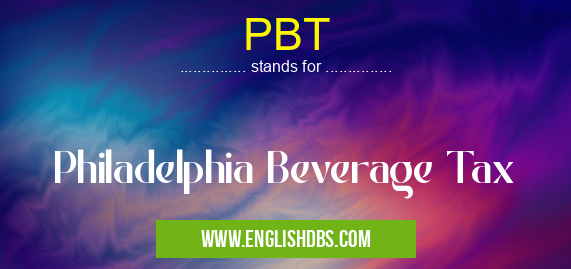What does PBT mean in TAX
Philadelphia Beverage Tax (PBT) is a tax imposed on the sale of sugary and diet beverages in the city of Philadelphia, Pennsylvania. This tax, which went into effect on January 1, 2017, is intended to:

PBT meaning in Tax in Business
PBT mostly used in an acronym Tax in Category Business that means Philadelphia Beverage Tax
Shorthand: PBT,
Full Form: Philadelphia Beverage Tax
For more information of "Philadelphia Beverage Tax", see the section below.
- Fund pre-kindergarten education and other early childhood programs
- Promote healthy eating and reduce the consumption of sugary drinks, which are linked to obesity and other health problems
PBT Meaning in BUSINESS
The PBT is a type of excise tax, which is a tax levied on the production, sale, or consumption of specific goods or services. In this case, the PBT is levied on the sale of sugary and diet beverages. Taxable beverages include:
- Sodas
- Sports drinks
- Energy drinks
- Fruit juices with added sugar
- Iced tea and coffee with added sugar
PBT Full Form
The full form of PBT is Philadelphia Beverage Tax. It is specifically used in the context of the tax levied on sugary and diet beverages in Philadelphia.
What Does PBT Stand For?
PBT stands for Philadelphia Beverage Tax. It is a concise and easily recognizable acronym used to refer to this specific tax.
Essential Questions and Answers on Philadelphia Beverage Tax in "BUSINESS»TAX"
What is the Philadelphia Beverage Tax (PBT)?
The PBT is a 1.5-cent-per-ounce tax on sugary and diet beverages, including soda, sports drinks, energy drinks, and sweetened teas and coffees. The tax is applied to beverages sold in Philadelphia by distributors, retailers, and restaurants.
What beverages are subject to the PBT?
The PBT applies to non-alcoholic beverages that contain added sugar or artificial sweeteners, including:
- Soda
- Sports drinks
- Energy drinks
- Sweetened teas and coffees
- Flavored water
- Fruit drinks
- Fruit juice with added sugar
Are there any exemptions to the PBT?
Yes, the following beverages are exempt from the PBT:
- Milk
- Infant formula
- Medical beverages
- Beverages sold by non-profit organizations
- Beverages sold in containers of 2 ounces or less
How is the PBT collected?
The PBT is collected by distributors and wholesalers who sell beverages to retailers, restaurants, and other businesses in Philadelphia. These businesses then pass the tax on to consumers through the price of the beverage.
What is the purpose of the PBT?
The PBT is designed to reduce consumption of sugary drinks, which are a major contributor to obesity, diabetes, and other health problems. The revenue generated from the tax is used to fund pre-kindergarten programs, community schools, and other initiatives that promote healthy living.
How has the PBT impacted beverage consumption in Philadelphia?
Studies have shown that the PBT has led to a significant decrease in the consumption of sugary drinks in Philadelphia. This has contributed to an overall decline in obesity rates and improvements in health outcomes.
Final Words: The PBT is a significant tax measure aimed at improving public health and funding early childhood education in Philadelphia. By understanding the meaning and implications of the PBT, businesses can ensure compliance and contribute to the overall goals of the tax.
PBT also stands for: |
|
| All stands for PBT |
